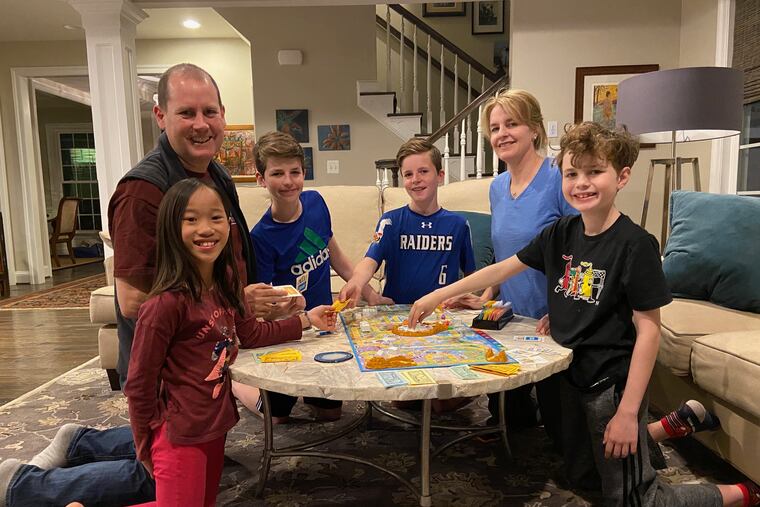A forced slow-down has been a welcome side effect of staying in place
It took a pandemic for this doctor to realize her pace was unsustainable.

It took a virus to slow us down. My husband and I, full-time working parents of four children, have been keeping a rapid pace for as long as we can remember. We live in Howard County, Md., which has a strong school system and competitive youth sports programs.
One month ago, a typical weekend would include basketball games, multiple flag football matches, and a gymnastics meet. When Sunday nights arrived, we were finishing school projects on a deadline, making the week’s schedule, and preparing meals for the coming days.
The coronavirus pandemic has brought that frantic pace to a screeching halt. The boys’ first spring baseball tournament was canceled, and our daughter’s state gymnastic meet was scrapped. Instead, we watched “The Sound of Music” and ate chips on the living room couch. The children’s schools are closed, and we are lucky enough to have jobs that allow us to predominantly work from home.
Rather than driving the children to and from extracurricular activities in the evenings, we now review essays and math problems we assigned them earlier in the day. We eat dinner together on a daily basis, instead of devouring to-go meals in the minivan. We take evening family walks to relieve restlessness. My husband and I enjoy watching our kids, ages 13, 11, 9, and 9, run outside and play with one another. While I’m not going to say there haven’t been arguments, our children have been forced to appreciate the companionship their siblings provide.
I have often reflected on our life pace, aware of its frenzied nature. I would meet a work deadline only to find my email inbox flooded with new requests and obligations for work, children, house, etc. I wanted the pace to slow a bit, but just kept going because I was uncertain what to give up. My husband and I used to look at each other at the end of the night, exhausted, and say “Yes, we should try to slow it down.” But the next day would come with an equally rapid tempo. I often wondered, “How do I do that? How do I find peace?”
While the novel coronavirus has caused fear across much of the world, including in my own house, it has also helped me find a measure of peace. I am conscious that it took a pandemic to slow life down for me. I was unable to make that difficult choice voluntarily. Today, I conversed with neighbors (from a distance) whom I have not seen in months, without anyone’s child calling: “Mom we are going to be late!” We had the gift of time.
I am acutely aware of the dangers of the pandemic. My employer, the University of Maryland School of Medicine, is taking all necessary precautions to minimize exposure and preparing for full extension of the health-care system. My sister’s family is currently on lockdown in Italy, a country where the virus is raging and more than 5,000 people have already died of it. And I continue to witness economic hardship for small businesses in my community, now indefinitely closed. I am not minimizing the grave concerns and sobering death rates inflicted by COVID-19, the disease caused by the virus, but I know the most important thing my family can do is stay away from other people. And doing that has made me question why it took a deadly disease for my family to enjoy a home-cooked meal together.
I rose at 5 a.m. Saturday to begin writing this piece before the kids began stirring and admittedly gave them screen time so I could finish it (just a few hours). I have two other unfinished pieces from previous years that I wanted to work on, but this is the first occasion that I completed this essay. After having some breakfast, my family will begin a jigsaw puzzle on the kitchen table — a definite first. I suspect we might complete it in a week, maybe two. My silver lining is that while I have a heavy heart for the many horrors of this crisis, I have been able to carve out a sliver of peace and gratitude in my home, as I suspect many of you have, as well. Maybe, it’s just in a different way than we were expecting.
Erin O’Connor is a clinical neuroradiologist and researcher at the University of Maryland School of Medicine.